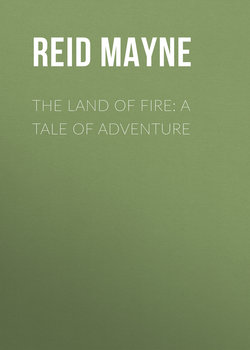Читать книгу The Land of Fire: A Tale of Adventure - Reid Mayne - Страница 1
Preface
ОглавлениеThis tale is the last from the pen of Captain Mayne Reid, whose stories have so long been the delight of English boys. Our readers may, perhaps, like to know something of the writer who has given them so much pleasure; especially as his own life was full of adventure and of brave deeds.
Mayne Reid was born in the north of Ireland in 1819; his father was a Presbyterian minister, and wished that his son should also be a clergyman; but the boy longed for adventure, and to see the world in its wildest places, and could not bring himself to settle down to a quiet life at home.
When he was twenty years old he set out on his travels, and, landing at New Orleans, began a life of adventure in the prairies and forests of America – good descriptions of which were given by him in his books.
In 1845 a war broke out between the United States and Mexico, and young Reid instantly volunteered his services to fight on the United States’ side.
He received the commission of lieutenant in a New York regiment, and fought all through the campaign with the most dauntless courage. He received several wounds, and gained a high reputation for generous good feeling.
The castle of Chapultepec commanded the high road to the city of Mexico, and as it was very strongly defended, and the Mexicans had thirty thousand soldiers to the American six thousand, to take it was a work requiring great courage.
Reid was guarding a battery which the Americans had thrown up on the south-east side of the castle, with a grenadier company of New York volunteers and a detachment of United States’ marines under his command. From thence he cannonaded the main gate for a whole day. The following morning a storming party was formed of five hundred volunteers, and at eleven o’clock the batteries ceased firing, and the attack began.
Reid and the artillery officers, standing by their guns, watched with great anxiety the advance of the line, and were alarmed when they saw that half-way up the hill there was a halt.
“I knew,” he said in his account, “that if Chapultepec was not taken, neither would the city be; and, failing that, not a man of us might ever leave the Valley of Mexico alive.” He instantly asked leave of the senior engineering officer to join the storming-party with his grenadiers and marines. The officer gave it, and Reid and his men at once started at a swift run, and came up with the storming-party under the brow of the hill, where it had halted to wait for scaling ladders.
The fire from the castle was constant, and very fatal. The men faltered, and several officers were wounded while urging them on. Suddenly Reid, conspicuous by his brilliant uniform, sprang to his feet, and shouted, “Men, if we don’t take Chapultepec, the American army is lost. Let us charge up the walls!”
The soldiers answered, “We are ready.”
At that moment the three guns on the parapet fired simultaneously. There would be a moment’s interval while they reloaded. Reid seized that interval, and crying “Come on,” leaped over the scarp, and rushed up to the very walls. Half-way up he saw that the parapet was crowded with Mexican gunners, just about to discharge their guns. He threw himself on his face, and thus received only a slight wound on his sword hand, while another shot cut his clothes.
Instantly on his feet again, he made for the wall, but in front of it he was struck down by a Mexican bullet tearing through his thigh.
There Lieutenant Cochrane, of the Voltigeurs, saw him as he advanced to the walls. Reid raised himself, and sang out, entreating the men to stand firm.
“Don’t leave the wall,” he cried, “or we shall be cut to pieces. Hold on, and the castle is ours.”
“There is no danger of our leaving it, captain,” said Cochrane; “never fear!”
Then the scaling ladders were brought, the rush was made, and the castle taken. But Reid had been the very first man under its walls.
When the war was over, Captain Reid resigned his commission in the American army, and organised a body of men in New York to go and fight for the Hungarians, but news reached him in Paris that the Hungarian insurrection was ended, so he returned to England.
Here he settled down to literary work, publishing “The Scalp Hunters,” and many wonderful stories of adventure and peril.
The great African explorer, the good Dr Livingstone, said in the last letter he ever wrote, “Captain Mayne Reid’s boys’ books are the stuff to make travellers.”
Captain Mayne Reid died on the twenty-first of October, 1883, and the “Land of Fire” is his unconscious last legacy to the boys of Great Britain, and to all others who speak the English language.
